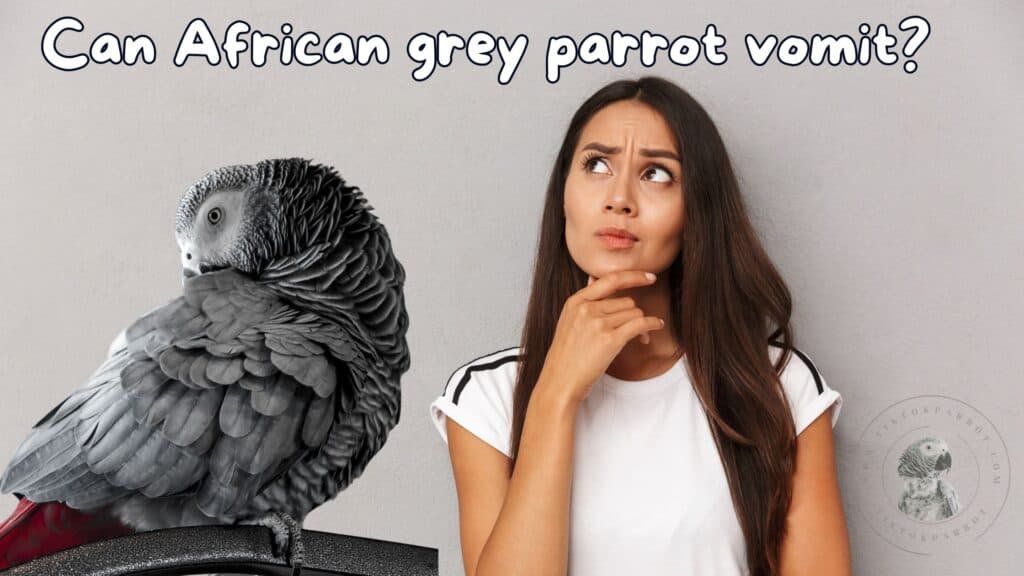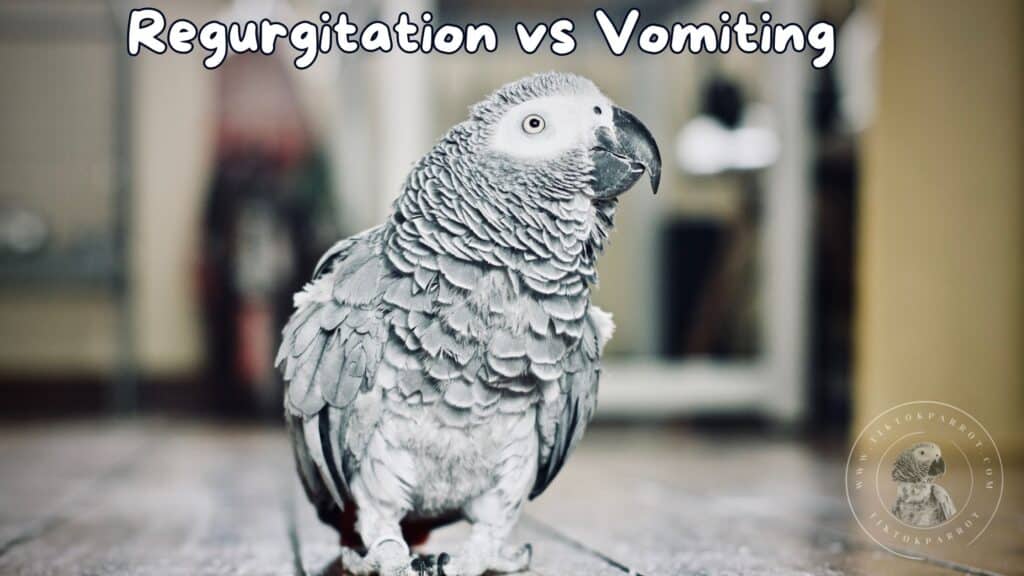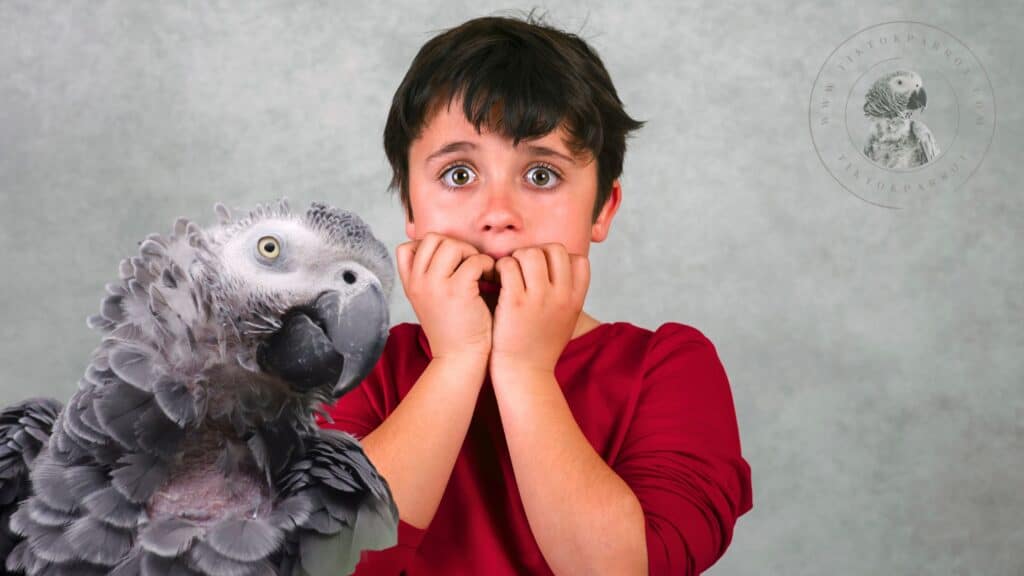Feathers rustle, a soft cooing emanates, and suddenly, your African Grey Parrot is engaged in a behavior that might make any pet owner raise an eyebrow: regurgitation, often referred to as ‘vomiting.’ Before panic sets in, let’s embark on a journey of understanding, uncovering the reasons behind this fascinating yet peculiar aspect of parrot behavior.
Dive into the fascinating world of African Grey Parrot behavior! Uncover the secrets behind ‘vomiting’—an affectionate gesture that speaks volumes. Explore the ‘why’ and ‘how’ in our insightful guide.
Can African grey parrot vomit?

Yes, African Grey Parrots, like many other birds, have the ability to regurgitate or vomit. However, in the case of birds, regurgitation is a natural behavior that serves various purposes such as bonding, courtship, and feeding young ones. It is different from vomiting as seen in mammals.
The Parrot’s Quirky Code: Decoding ‘Vomiting’
Firstly, let’s dispel the notion of traditional vomiting as seen in humans. For African Grey Parrots, regurgitation is a normal, instinctive behavior deeply rooted in their social dynamics. It’s their way of expressing affection, forming bonds, and establishing a connection, primarily seen during courtship or nurturing relationships.
Affection in Action: The ‘Why’ Behind the Behavior
When your African Grey Parrot regurgitates, it’s essentially offering a part of its food as a gesture of love or bonding. In the wild, this behavior is crucial for maintaining social harmony within flocks. In a domestic setting, your parrot might direct this affectionate act towards its owner, a favorite toy, or even you, their chosen ‘flock member.’
The Anatomy of ‘Vomiting’: How it Happens
Understanding the physiological aspect helps demystify the process. During regurgitation, the parrot’s muscles work in reverse, pushing food from its crop back up to the beak. It’s an intentional and controlled action, distinguished from involuntary vomiting seen in mammals. The expelled food is often semi-digested and is offered as a sign of trust and affection.
When to Worry: Recognizing Abnormal ‘Vomiting’
While regurgitation is a natural behavior, there are instances where it could signal an underlying issue. Persistent or forceful regurgitation, changes in the appearance of the expelled material, or accompanying signs of distress may indicate a health concern. If you observe such behaviors, seeking prompt veterinary advice is crucial to ensure the well-being of your feathered friend.
Creating a Harmonious Environment: Tips for Parrot Parents
To foster a healthy and balanced relationship with your African Grey Parrot, acknowledge and reciprocate their affectionate gestures. Additionally, maintain a well-rounded diet, offer mental stimulation, and ensure regular veterinary check-ups to catch any potential health issues early on.
Regurgitation vs Vomiting

Understanding the difference of parrot behavior is crucial for responsible bird parenting. One of the behaviors that often perplexes owners is the act of regurgitation, commonly mistaken for vomiting. Let’s decode the distinctions between regurgitation and vomiting in our cherished parrots.
Regurgitation: The Language of Love
Why It Happens: Regurgitation in parrots, including African Greys, is a natural and instinctive behavior rooted in social bonding. It is a voluntary act where the bird brings up semi-digested food, often as a sign of affection or as part of courtship rituals.
How It Occurs: During regurgitation, the parrot’s muscles work in reverse, gently bringing up food from the crop to the beak. This deliberate and controlled process distinguishes it from the involuntary nature of vomiting seen in mammals.
Vomiting: A Sign of Concern
Why It Happens: Vomiting in parrots is far less common and typically indicative of an underlying health issue. It is an involuntary expulsion of the contents of the stomach and may be caused by factors such as illness, dietary problems, or digestive disorders.
How It Occurs: Unlike regurgitation, vomiting is often forceful and may be accompanied by signs of distress, lethargy, or changes in behavior. It requires immediate attention from a qualified avian veterinarian.
Key Differences: Recognizing the Signs
- Voluntary vs. Involuntary: Regurgitation is a purposeful, intentional act initiated by the parrot, while vomiting is an involuntary response often linked to health concerns.
- Context Matters: Regurgitation is usually seen in social or affectionate contexts, whereas vomiting is not associated with positive interactions.
- Consistency of Material: Regurgitated material is typically semi-digested and may be offered as a ‘gift,’ while vomited material is often more liquid and may indicate a health problem.
Being attuned to these behavioral nuances is essential for responsible parrot parenting. While occasional regurgitation is a normal part of a parrot’s social behavior, persistent or forceful vomiting requires immediate veterinary attention. Understanding the difference between these behaviors allows us to provide the best care for our African Grey companions, ensuring their health and happiness in our homes.
Nurturing the Bond with Understanding
In the realm of African Grey Parrots, regurgitation is not a cause for alarm; it’s a testament to the deep connections these intelligent birds form with their human companions. Embrace this quirky behavior as a unique form of avian communication, and relish the special bond that makes sharing your life with a feathered friend truly extraordinary.
Understanding the ‘why’ and ‘how’ behind parrot regurgitation transforms this behavior from a mystery to a heartwarming expression of love in the fascinating world of our avian companions.
If you notice your African Grey Parrot regurgitating occasionally, especially in the context of social interactions or bonding, it’s likely a normal behavior. However, if you observe frequent or persistent vomiting, it could be a sign of an underlying health issue, and you should consult with an avian veterinarian promptly. Unexplained or frequent vomiting in birds may indicate a digestive problem, infection, or other health concerns that require professional attention. Regular veterinary check-ups are essential for the well-being of pet birds.
Frequently Asked Questions (FAQ)
- Why does my African Grey Parrot engage in vomiting behavior?
- A: Vomiting in parrots is not a common behavior and may indicate an underlying health issue that requires immediate attention.
- A: Vomiting in parrots is not a common behavior and may indicate an underlying health issue that requires immediate attention.
- Q: How can I distinguish between regurgitation and vomiting in my parrot?
- A: Regurgitation is a voluntary, controlled act associated with affection, while vomiting is forceful, involuntary, and usually linked to health concerns.
- A: Regurgitation is a voluntary, controlled act associated with affection, while vomiting is forceful, involuntary, and usually linked to health concerns.
- Q: Are there specific signs that my parrot is vomiting and not regurgitating?
- A: Forceful expulsion, changes in behavior, and signs of distress are indicators of vomiting, necessitating prompt veterinary care.
- A: Forceful expulsion, changes in behavior, and signs of distress are indicators of vomiting, necessitating prompt veterinary care.
- Q: Is occasional vomiting normal for African Grey Parrots?
- A: No, vomiting is not a normal behavior in parrots and should be taken seriously. Consult with a vet if you observe vomiting.
- A: No, vomiting is not a normal behavior in parrots and should be taken seriously. Consult with a vet if you observe vomiting.
- Q: What could be the reasons behind my parrot’s vomiting behavior?
- A: Vomiting can be caused by various factors, including illness, dietary problems, or digestive disorders. A vet examination is crucial for a diagnosis.
- A: Vomiting can be caused by various factors, including illness, dietary problems, or digestive disorders. A vet examination is crucial for a diagnosis.
- Q: Should I be concerned if my parrot vomits once and then seems fine?
- A: While a one-time occurrence might not be alarming, persistent or repeated vomiting requires immediate veterinary attention.
- A: While a one-time occurrence might not be alarming, persistent or repeated vomiting requires immediate veterinary attention.
- Q: Can a change in diet trigger vomiting in African Grey Parrots?
- A: Yes, sudden changes in diet or the introduction of new foods may upset a parrot’s digestive system and lead to vomiting.
- A: Yes, sudden changes in diet or the introduction of new foods may upset a parrot’s digestive system and lead to vomiting.
- Q: Are there home remedies for parrot vomiting?
- A: No, vomiting in parrots requires professional veterinary evaluation. Home remedies are not a substitute for proper medical care.
- A: No, vomiting in parrots requires professional veterinary evaluation. Home remedies are not a substitute for proper medical care.
- Q: Can stress induce vomiting in African Grey Parrots?
- A: Yes, stress is a potential factor that may contribute to digestive issues in parrots, leading to vomiting.
- A: Yes, stress is a potential factor that may contribute to digestive issues in parrots, leading to vomiting.
- Q: How quickly should I seek veterinary care if my parrot vomits?
- A: Immediately. Vomiting is not a normal behavior, and prompt veterinary attention is crucial to identify and address the underlying cause.
- A: Immediately. Vomiting is not a normal behavior, and prompt veterinary attention is crucial to identify and address the underlying cause.
- Q: Can vomiting be a sign of infectious diseases in parrots?
- A: Yes, certain infectious diseases can manifest with digestive issues, including vomiting. A vet can conduct tests for accurate diagnosis.
- A: Yes, certain infectious diseases can manifest with digestive issues, including vomiting. A vet can conduct tests for accurate diagnosis.
- Q: Are there preventive measures to avoid parrot vomiting?
- A: Providing a stable environment, a balanced diet, and regular veterinary check-ups can help prevent potential health issues that may lead to vomiting.
- A: Providing a stable environment, a balanced diet, and regular veterinary check-ups can help prevent potential health issues that may lead to vomiting.
- Q: Can parrot vomiting be a result of poisoning?
- A: Yes, ingestion of toxic substances can lead to vomiting. If you suspect poisoning, seek emergency veterinary care immediately.
- A: Yes, ingestion of toxic substances can lead to vomiting. If you suspect poisoning, seek emergency veterinary care immediately.
- Q: Does age play a role in parrot vomiting tendencies?
- A: Vomiting is not age-dependent; however, older parrots may be more susceptible to certain health issues. Regular vet check-ups are essential.
- A: Vomiting is not age-dependent; however, older parrots may be more susceptible to certain health issues. Regular vet check-ups are essential.
- Q: Can parrot vomiting be seasonal or linked to environmental changes?
- A: While environmental changes can impact a parrot’s health, vomiting is not considered a normal response to such changes. Consult a vet for guidance.
- A: While environmental changes can impact a parrot’s health, vomiting is not considered a normal response to such changes. Consult a vet for guidance.
- Q: Can hormonal changes contribute to parrot vomiting behavior?
- A: Yes, hormonal changes, especially during breeding seasons, may affect a parrot’s digestive system and lead to vomiting.
- A: Yes, hormonal changes, especially during breeding seasons, may affect a parrot’s digestive system and lead to vomiting.
- Q: Should I withhold food if my parrot is vomiting?
- A: It’s crucial not to withhold food. Consult a vet promptly for guidance on appropriate care and potential dietary adjustments.
- A: It’s crucial not to withhold food. Consult a vet promptly for guidance on appropriate care and potential dietary adjustments.
- Q: Can I treat parrot vomiting with over-the-counter medications?
- A: No, self-medicating parrots can be dangerous. Only a qualified avian vet should prescribe medications after a thorough examination.
- A: No, self-medicating parrots can be dangerous. Only a qualified avian vet should prescribe medications after a thorough examination.
- Q: Can vomiting be a sign of crop issues in African Grey Parrots?
- A: Yes, crop-related problems can lead to vomiting. A vet can perform diagnostic tests to identify and address such issues.
- A: Yes, crop-related problems can lead to vomiting. A vet can perform diagnostic tests to identify and address such issues.
- Q: How can I comfort my parrot after vomiting episodes?
- A: Provide a quiet and stress-free environment, offer clean water, and seek veterinary advice promptly for proper care and treatment.
- A: Provide a quiet and stress-free environment, offer clean water, and seek veterinary advice promptly for proper care and treatment.
- Q: Is there a connection between parrot vomiting and the presence of parasites?
- A: Yes, parasitic infections can affect a parrot’s digestive system, potentially leading to vomiting. A vet can perform tests to diagnose and treat parasites.
- A: Yes, parasitic infections can affect a parrot’s digestive system, potentially leading to vomiting. A vet can perform tests to diagnose and treat parasites.
- Q: Can certain foods or treats trigger vomiting in African Grey Parrots?
- A: Yes, some foods may be difficult for parrots to digest, leading to vomiting. Ensure a well-balanced and parrot-friendly diet to minimize this risk.
- A: Yes, some foods may be difficult for parrots to digest, leading to vomiting. Ensure a well-balanced and parrot-friendly diet to minimize this risk.
- Q: Should I be concerned if my parrot vomits after preening or bathing?
- A: Occasional vomiting post-preening or bathing may be normal due to swallowed water. However, consistent vomiting in these situations should be evaluated by a vet.
- A: Occasional vomiting post-preening or bathing may be normal due to swallowed water. However, consistent vomiting in these situations should be evaluated by a vet.
- Q: Can emotional distress or changes in the household cause parrot vomiting?
- A: Yes, African Grey Parrots are sensitive to changes. Emotional distress can contribute to digestive issues, including vomiting.
- A: Yes, African Grey Parrots are sensitive to changes. Emotional distress can contribute to digestive issues, including vomiting.
- Q: Can respiratory infections lead to vomiting in parrots?
- A: While respiratory issues may cause other symptoms, vomiting is not a typical sign. Consult a vet for proper evaluation if respiratory issues are observed.
- A: While respiratory issues may cause other symptoms, vomiting is not a typical sign. Consult a vet for proper evaluation if respiratory issues are observed.
- Q: Can my parrot vomit due to overeating or bingeing?
- A: Overeating can strain a parrot’s digestive system, potentially leading to vomiting. Monitor their food intake and ensure portion control to avoid this.
- A: Overeating can strain a parrot’s digestive system, potentially leading to vomiting. Monitor their food intake and ensure portion control to avoid this.
- Q: Can systemic diseases contribute to parrot vomiting?
- A: Yes, certain systemic diseases affecting various organs may result in vomiting. A comprehensive vet examination is essential for accurate diagnosis.
- A: Yes, certain systemic diseases affecting various organs may result in vomiting. A comprehensive vet examination is essential for accurate diagnosis.
- Q: Can gastrointestinal blockages cause vomiting in African Grey Parrots?
- A: Yes, blockages can disrupt the digestive process and lead to vomiting. Immediate veterinary attention is crucial to address this serious issue.
- A: Yes, blockages can disrupt the digestive process and lead to vomiting. Immediate veterinary attention is crucial to address this serious issue.
- Q: Should I alter my parrot’s diet after vomiting episodes?
- A: Dietary changes should be made under the guidance of a vet. They can recommend adjustments based on the specific needs and health of your parrot.
- A: Dietary changes should be made under the guidance of a vet. They can recommend adjustments based on the specific needs and health of your parrot.
- Q: Can vomiting in African Grey Parrots be a sign of cancer?
- A: While it’s not a common sign, persistent vomiting may warrant investigations, including tests for potential underlying health issues such as cancer. Consult a vet for a thorough examination.
If you found this blog helpful, It would be great if you could share it with your family and friends who might find it useful as well.
You might like to read these as well
Common Health Problems of African Greys
Important Facts about African Grey Health You Need to Know
Why African Grey Parrots Pluck Feathers
Shaking Your Tailfeathers: An African Grey Self Harming
African Grey Parrot Male or Female? (Determine Gender of African Grey)
How can you determine the age of an African grey parrot?
Unlock the Secrets of Choosing the Perfect African Grey Parrot
The Importance of a Cage for Your African Grey Parrot
How Do We Take Care of an African Parrot Grey’s Health?
For more useful content about African grey parrots, you can subscribe my site with your email to get notification upon publishing a new blog, the subscribe box you can see on the right side of this page. Also if you get an alert on your web browser while browsing my site, allow it and that will also give you an alert whenever I publish a new blog.
Stay safe and much love !




